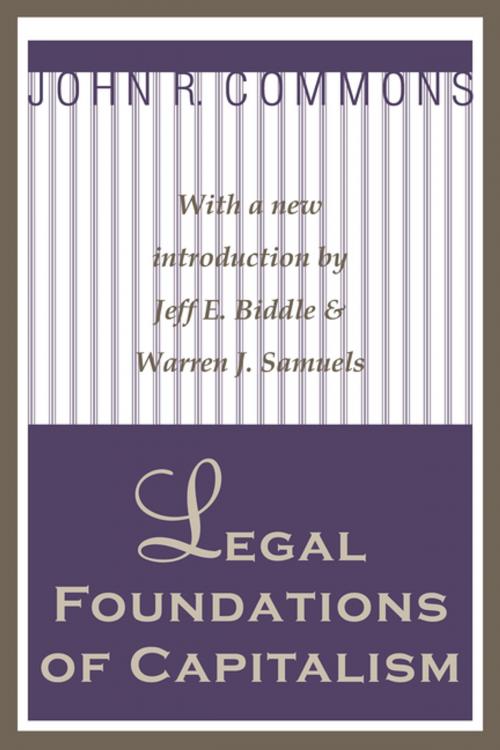Legal Foundations of Capitalism
Nonfiction, Social & Cultural Studies, Social Science, Sociology, Business & Finance, Economics| Author: | John R. Commons | ISBN: | 9781351509107 |
| Publisher: | Taylor and Francis | Publication: | July 5, 2017 |
| Imprint: | Routledge | Language: | English |
| Author: | John R. Commons |
| ISBN: | 9781351509107 |
| Publisher: | Taylor and Francis |
| Publication: | July 5, 2017 |
| Imprint: | Routledge |
| Language: | English |
In what has universally been recognized as a classic of institutional economics, John R. Commons combined the skills of a professional economist, the sensibilities of an American historian, and the passion of an active participant in the conflicts of individuals, self-interest of groups, and function of voluntary associations.The aim of this volume is to work out an evolutionary and behavioral theory of value. In order to do so thoroughly, Commons examines the decisions of the courts. Doing so compelled an examination of what the courts mean by reasonable value. Commons found that the answer was tied up with a notion of reasonable conduct. It was Commons who carried the study of the habits and customs of social life to the next stage: the decisions of the courts that are based on custom and that profoundly impact the nature and function of the economic system as such.Reviewing Legal Foundations of Capitalism, Wesley Mitchell declared that Commons carried this "analysis further along his chosen line than any of his predecessors. Into our knowledge of capitalism he has incorporated a great body of new materials which no one else has used adequately." And writing in the same American Economic Review twenty-one years later, Selig Perlman noted that "To Commons the workingmen were not abstract building blocks out of which a favored deity called History was to shape the architecture of the new society, but concrete beings with legitimate ambitions for a higher standard of living and for more dignity in their lives." This edition is graced with a special introduction that places Commons in proper academic as well as intellectual context.
In what has universally been recognized as a classic of institutional economics, John R. Commons combined the skills of a professional economist, the sensibilities of an American historian, and the passion of an active participant in the conflicts of individuals, self-interest of groups, and function of voluntary associations.The aim of this volume is to work out an evolutionary and behavioral theory of value. In order to do so thoroughly, Commons examines the decisions of the courts. Doing so compelled an examination of what the courts mean by reasonable value. Commons found that the answer was tied up with a notion of reasonable conduct. It was Commons who carried the study of the habits and customs of social life to the next stage: the decisions of the courts that are based on custom and that profoundly impact the nature and function of the economic system as such.Reviewing Legal Foundations of Capitalism, Wesley Mitchell declared that Commons carried this "analysis further along his chosen line than any of his predecessors. Into our knowledge of capitalism he has incorporated a great body of new materials which no one else has used adequately." And writing in the same American Economic Review twenty-one years later, Selig Perlman noted that "To Commons the workingmen were not abstract building blocks out of which a favored deity called History was to shape the architecture of the new society, but concrete beings with legitimate ambitions for a higher standard of living and for more dignity in their lives." This edition is graced with a special introduction that places Commons in proper academic as well as intellectual context.















